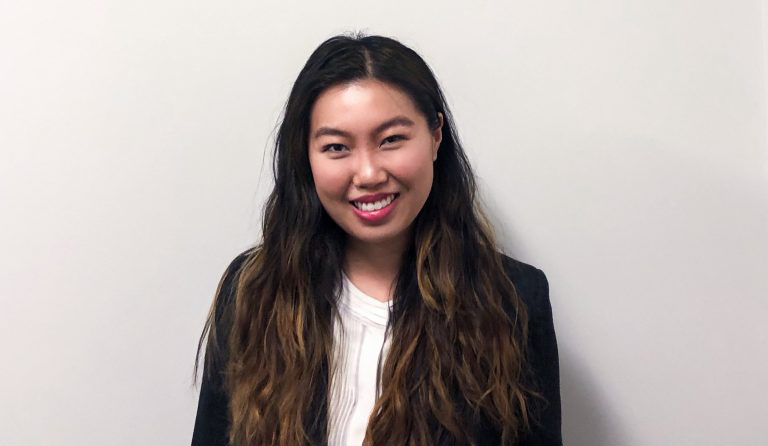Interest in Patent Law Leads to an Externship with Federal Circuit Appeals Court Sheena Wang '21L, says that professors, alumni and older law students helped her secure a position with the United States Court of Appeals for the Federal Circuit
Sheena X. Wang is from Toronto, ON, Canada. She attended the University of Western Ontario, where she received a B.S. Honors Double Major in Genetics and Cell Biology. After completing her undergraduate studies, she attended Johns Hopkins University and received an M.S. in Biotechnology. At W&L Law she is a Lead Articles Editor for the German Law Journal and a member of several student organizations, including the Women Law Students Organization, the Sports, Entertainment and Intellectual Property Society, and the Asian-Pacific American Law Students Association.
Where did you work this fall?
This fall semester I participated in the D.C. externship program with the United States Court of Appeals for the Federal Circuit in Washington D.C. The Federal Circuit is unique among the federal courts of appeals because it is the only appeals court that has its jurisdiction based upon subject matter rather than geographic location. The Federal Circuit hears appeals from all of the United States District Courts, some administrative agencies, and cases arising under certain statutes. Among other things, the Federal Circuit has exclusive jurisdiction over patent appeals, government contracts, veterans’ benefits, and vaccine claims. While at the Federal Circuit, I worked on a variety of writing and research projects in many different subject matters, with a focus on patent law cases.
How did you secure this position?
I got the position through an upper year law student referral. I told my Intellectual Property professor, Professor Seaman, that I was interested in working in patent law, and he directed me to several alumni connections and upper year students who are working, or plan to work, in this field. One of the upper year students I spoke to, Daniele San Roman, told me about the fall externship opportunities available at the Federal Circuit and helped guide me through the application process. After I applied for this position, I participated in a phone interview before I was offered the position.
Describe your work experience.
As a judicial extern at the Federal Circuit, I researched and summarized case law, regulations, and statutes regarding issues in patent law, government contracts, veterans’ benefits, and petitions for compensation under the National Vaccine Injury Compensation Program. I also drafted memos summarizing judicial opinions, petitions for rehearing en banc, and current issues regarding subject matter under the Federal Circuit’s jurisdiction. I had the opportunity to virtually attend court proceedings such as oral arguments, en banc rehearings, and internal court events designed to educate Federal Appellate Court clerks and employees. I also regularly participated in meetings with law clerks, where we discuss the judicial process, and certain substantive law topics within the Federal Circuit’s jurisdiction.
What were some skills you developed this fall?
I improved my writing and research skills through the assignments that I received this fall. The short turnaround time and the volume of writing assignments required me to learn how to write quickly while still producing a high quality product. Furthermore, most of the memos that I worked on at my externship were much shorter than my school projects, as the purpose of the memo is to convey all of the key information quickly, which required me to learn how to be more concise in my writing. I also learned more about the judicial process through working on cases that came through the Federal Circuit, listening to oral arguments, and discussions with my judge and his clerks. Additionally, because my externship required us to work remotely, I developed the skill to work productively from home.
What surprised you about the work you did this fall?
I was surprised by how well the Federal Circuit adapted to transitioning to a completely virtual environment due to current events. The staff worked hard to transition everything to allow all of the judges, clerks, and interns to work from home. My judge and his clerks also tried very hard to give the fall interns the same collaborative environment despite of the challenges of communicating completely online. They made an effort to be available for phone and video calls, and set up virtual social events to get to know the fall interns. Even though I worked remotely this fall, I still felt that I had the opportunity to get to know the clerks and judges at the Federal Circuit.
What was your favorite aspect of your fall work experience?
My favorite aspect of my fall work experience was listening to oral arguments for cases that came through the Federal Circuit. What made this experience especially interesting was that, often, I had already analyzed the legal issues in the cases that were being argued. I was interested in seeing how the attorneys for each side discussed the legal issues in the cases that I worked on, and it also made me appreciate the hard work that goes into preparing for litigation as an attorney.
Has this experience helped you figure out your post graduate plans, and if so how?
This experience helped me learn more about patent law, the Federal Circuit, and the judicial process. I will definitely be able to take everything I learned from this experience to my future career in patent law. After graduation, I will work for a law firm in Washington D.C. that specializes in intellectual property law, so all of the skills and experiences that I gained through this externship will directly contribute to building my career in the field of patent law.
 Sheena Wang ’21L
Sheena Wang ’21L
You must be logged in to post a comment.